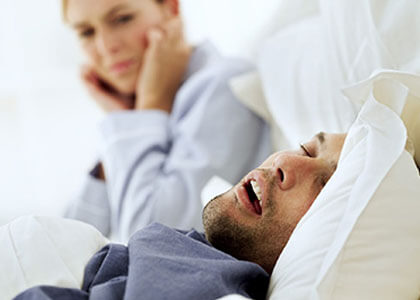Indianapolis sleep apnea treatment sidesteps the side effects of CPAP
Obstructive sleep apnea is a sleep disorder that is commonly mistaken for loud, chronic snoring. When a person has obstructive sleep apnea, however, the overall impact on his or her quality of life is significant. Though several treatment options exist for various sleep disorders, there is no given treatment that is right for every person. In the treatment of obstructive sleep apnea, the first line treatment most often considered is CPAP therapy.
CPAP therapy is administered on a nightly basis, or any time the patient sleeps. CPAP stands for continuous positive airway pressure. This form of treatment maintains an open airway through the continuous delivery of forced air. In order to accomplish this goal, air from a compressor is directed through the nasal passages via some type of nasal mask which is strapped around the head.
The design of the CPAP machine is actually quite successful in keeping the airway open. However, many people who attempt to treat obstructive sleep apnea with CPAP do not comply with treatment 100 percent. Obviously, if compliance is not 100 percent, then functional sleep cannot be restored.
 Poor CPAP compliance may occur due to issues such as:
Poor CPAP compliance may occur due to issues such as:
- Sleep disruption due to the sound of the CPAP machine.
- The CPAP mask causes skin irritation.
- Sleeping while “hooked up to a machine” is emotionally upsetting.
- Difficulty breathing against forced air occurs.
- The throat and / or nose becomes chronically dry.
- Eyes become irritated from air leaking beneath the mask.
- The sound of the voice changes.
- Chronic headaches develop.
- Chronic ringing in the ears develops.
- Chronic sinus infections occur.
- Air gets into the stomach, causing discomfort.
- The patient feels claustrophobic.
Though CPAP is often the first form of treatment prescribed for obstructive sleep apnea, it is clear why compliance with this therapeutic treatment may be low. Some may be surprised to hear that, with the help of their Indianapolis dentist, they can find a form of sleep apnea treatment that is both comfortable and effective.
Dr. Church is an experienced dentist who has helped several Washington Street Dentistry patients rediscover the benefits of restorative sleep. In oral appliance therapy, many people can find a suitable alternative to CPAP. Designed around each patient, oral appliances are non-invasive, portable, discreet, quiet, and comfortable. In clinical trials for oral appliance therapy, more than 95 percent of participants reported a dramatic decrease in apneic episodes and obstructive sleep apnea symptoms.
Sleep is a vital component to good health. To learn more about oral appliance therapy as a CPAP alternative, contact Washington Street Dentistry at (317) 333-6788.
Share this Article
Back to Sleep Apnea Page





